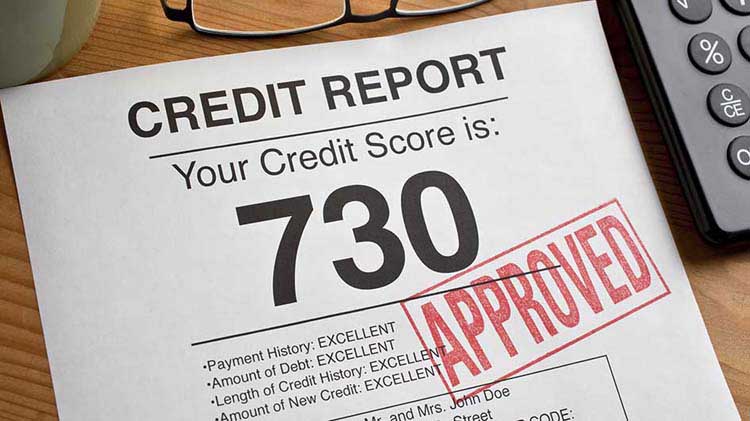What is a good credit score?
Do you know your credit score and why it’s an important number? Do you know how to get a credit report and score? There is a lot to know. Let’s dig in and learn about it all.
What is a credit score and how is it figured?
Have you ever wondered how you qualified for a loan? Or why you didn't? Perhaps you ended up with an interest rate higher than the one advertised. Your credit score may be the reason. One auto lender may offer lower interest rates to people with scores above 680, while another lender may use 720.
Your credit score is often called a FICO® score, named after the Fair Isaac Corporation, a California-based company that developed software to compute the first credit scores. The FICO scoring method assigns a three-digit number ranging from 300 to 850 that lenders use to determine your creditworthiness. The higher the number, the more likely it is that you will get the credit you want at a desirable rate.
It's a good idea to also monitor your credit report periodically, which you can do by receiving a free yearly credit report at freecreditreport.com. Generally speaking:
- 300-650 is considered high risk
- 650-700 is medium risk
- 700-750 is low risk
- 750-850 is considered very low risk
What impacts your credit score?
In order to get better control of your credit, you need a good grasp on what credit is and how it works. Basically, your credit score is the measure of your financial responsibility – how you handle your money. What impacts the score?
- Payments. Making payments on time does in fact improve your score. And not just credit cards and loan payments are tracked. Your cell phone payment history could be reported to a credit bureau.
- Balances. For an improved rating, it's important to utilize less than 30% of the credit you're given on all your revolving accounts.
- Credit history. Should you cancel cards you no longer use? The answer is – probably not. The longer a card is open, the longer your credit history. When you cancel a card, you lose all that credit history.
Credit questions and answers
- Does applying for a credit card hurt your credit? Applying for a credit card or loan creates a "hard hit" on your credit report, which can sometimes hurt your score. Those hard hits can make up 10% of your overall credit score. To avoid this, spacing out credit or loan applications over a period of time will limit the times these hits show up. These inquiries remain on your credit report for two years but only affect your actual credit score for a year.
- Is it better to pay with cash vs credit card? Cash is invisible to lenders. If you pay cash for everything, it doesn't show the credit rating bureaus that you are able to manage credit responsibly.
- Does income affect credit score? This is a confusing one, but the reality is credit bureaus don't consider income in determining credit scores. Although some lenders look at both income and debt-to-income ratios for decisions on how much to lend you, your actual credit score is not impacted based on your income. Low wage earners can have a really good credit score and high wage earners can have a very low credit score.
- Why do lenders look at credit reports? Lenders look at your credit report and score to gauge your ability to manage different types of credit. The major types are:
- Revolving Credit. These can be credit cards or other forms of credit that do not have an end date or term. You have a credit limit and must make payments toward the balance each month.
- Installment Credit. These may include student loans, car loans, mortgage loans and other types. Installment credit is a loan that's repaid over a defined period of time.
- If I pay off my credit card in full will my credit go up? Paying the full balance immediately should improve your credit score.
- Will paying on time improve my credit? Paying on time is the most important thing you can do to improve your credit score.
How does the credit score break down?
Let's imagine you're getting ready to buy a car. You've saved a good portion of the money to pay for it, but you'll still need a loan to help purchase it from the dealer. Before any lender decides to give you a loan for the car, they will check your credit score.
Your credit score is made up of five key components:
- 35% - Payment history
- 30% - Credit utilization ratio
- 15% - Length of credit history
- 10% - Credit inquiries
- 10% - Credit mix
This data feeds into a credit report. The report basically indicates the level of responsibility with which you pay your bills and loans. If you have a history of consistently missing payments and maxing out your credit cards (without paying them down), you should anticipate a low credit score. On the other hand, if you make your payments on time and you stay under 30 percent of your credit limits, you'll have a higher credit score.
How common are "good" credit scores?
According to the Fair Isaac Corporation in 2021, credit scores were typically spread among the population as follows:
- 24.7% of the population falls below 650
- 12.5% of the population is between 650-699
- 16.4% of the population is between 700-749
- 23.1% of the population is between 750-799
- 23.3% of the population has a credit score above 800
How to rebuild credit
Improving your credit score is possible, and you can rebuild a poor credit history. Understanding what goes into your credit score can help you understand how to rebuild it. Here are some actions you may take to help you rebuild credit.
- Check your credit card account online regularly. Look over your purchases to make sure they were accurately charged, as mistakes can be made. If you see a late fee from your last payment, make sure you find out why and pay before it's 30 days late.
- Pay your bills on time to have a positive impact on your credit report, since bills over 30 days late will appear on your report. Payment history is the biggest factor of your credit score. Late payments can remain on your report for 7 years from the original delinquency. If you begin paying on time now and stay current, your past late payments will affect your score less and less over time and can one day drop off.
- Keep your credit utilization below 30%. Credit utilization is the second most important factor after payment history. Credit utilization ratio is the relation between your available revolving credit and your revolving credit balance. Revolving credit includes revolving loans like your credit cards and does not include non-revolving loans such as your mortgage or auto loan. And if you can keep your credit utilization at 10% or below, that will be even better for your credit score.
- Be aware that bankruptcies will stay on your credit report for 10 years. Don't let that deter you from building your credit: the impact will lessen over time. Continue making payments on time and keep your credit utilization rate low.
- Add a monthly recurring charge (cell phone bill, gym membership, etc.) to keep old credit cards active. This can help you keep a low credit utilization rate because you're using less of your available credit.
- Secured credit cards are an option if your credit score doesn't allow you to have a regular (unsecured) credit card, if you don't have any credit history and want to build it up safely, or if you want to place a limit on how much you can spend on your card. These differ from regular (unsecured) credit cards because they require you to place a deposit in order to be granted a line of credit. The line of credit is generally equal to your deposit. Credit issuers can then use that deposit as collateral if you're unable to pay.
- Becoming an authorized user on a credit card can be a great way to improve credit score. An authorized user is someone who is added to the primary cardholder's credit card account. The authorized user is allowed to use the primary cardholder's card and can have their own card issued with their name on it. If the primary cardholder makes their payments on time, their payment history can have a positive impact on your credit. However, if they don't make their payments on time, you may want to reconsider being added to their card, as the late payments can have a negative impact on your credit.
How long does it take to rebuild credit?
- The length of time for improvement depends on what is on your credit report. If you have a lower credit score or no credit history, you might see an improvement within a few billing cycles just by paying your loans and/or credit cards on time and lowering your credit utilization rate.
- Communicate with institutions and lenders if you are having difficulty paying your bills. They will generally work with you. If a lender is able to remove any negative history from your report, you could see significant improvement as you continue to pay your bills on time.
Build a plan for how to fix your credit
The factors that impact your credit score and how they interact with your financial decisions day to day is important for understanding what actions you can take now to begin rebuilding credit. Some steps to take are:
- Look at your credit report to pinpoint where your setback happened — such as high credit card balances, missed payments or too many open accounts.
- Turn the knowledge of what happened in the past into improved actions today.
- Begin making decisions to establish and improve your credit.
Credit reports, credit scores and credit bureaus
Reports
- The report includes everything that factors into your score — but the actual score isn’t always included in the report.
- Your credit report ultimately determines your credit score.
- Your credit report contains information about your history of payments, credit utilization ratio and other items.
- Look at the different types of credit on your credit report (revolving credit, installment credit, judgments, liens, collections and who has been inquiring on your credit).
- You can calculate your mid-score by looking at all three (Experian, TransUnion and Equifax) credit bureau scores and then taking an average of all three scores.
Scores
- Your credit score is a synopsis of your financial history.
- The higher the credit score the better.
- Credit inquires make up to 10% of your score. They come in two types of inquiries - soft and hard. Hard inquiries may hurt your credit, while soft inquiries generally do not.
- Each of the three major credit bureaus has its own version of your credit report. Make sure you know what information each contains by checking for free at AnnualCreditReport.com.
- Unless you and your significant other have joint accounts, your credit report and credit score are yours and yours alone.
Bureaus
There are three major credit bureaus: Equifax, Experian and TransUnion. Each bureau creates its own version of your credit report and may have different details because they only reflect what information is shared with them. Not all entities report data to all credit bureaus.
Monitor your activity and credit by checking AnnualCreditReport.com. Look for inaccuracies. Be sure to look at both your credit report and credit score. Checking these will help you monitor, adjust and plan to make the changes you need to improve your credit score. There are ways you can budget and make adjustments to improve your credit relatively quickly.
Annual credit report
When you request a credit report, make sure everything on the report is correct. If you need to, there are instructions included with your credit report for how to dispute any false data. This is important because all of the details in the report determine your score. Removing incorrect information could cause a quick bump up in score. Other things to keep in mind about your credit report are:
- AnnualCreditReport.com allows you to pull one credit report from each credit bureau every 12 months (Tip: Instead of pulling all three every 12 months, pull one bureau every four months).
- Credit repair companies can pull your credit to help, but in reality, you can repair things yourself without the added expense.
- Save credit reports for your own records.




